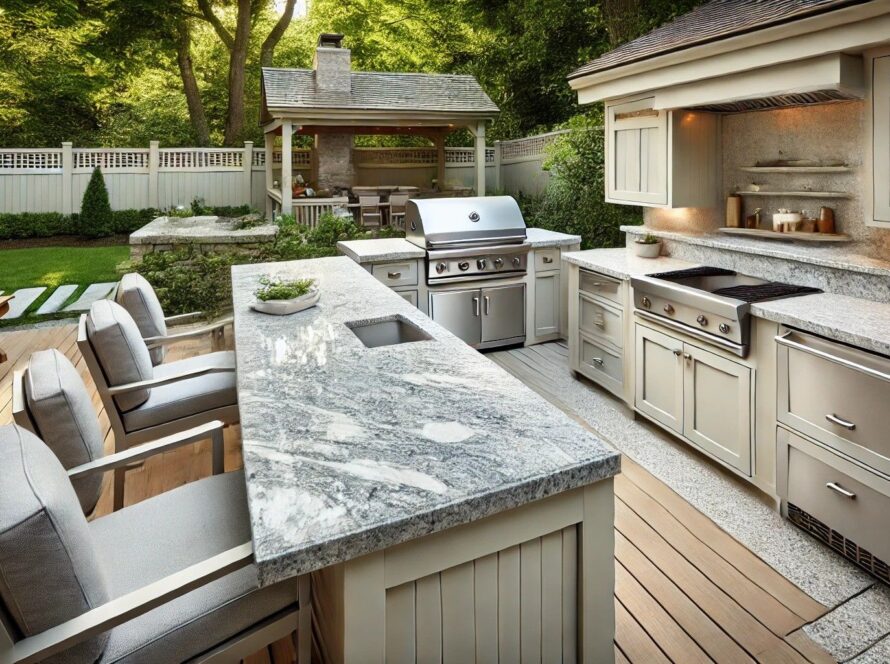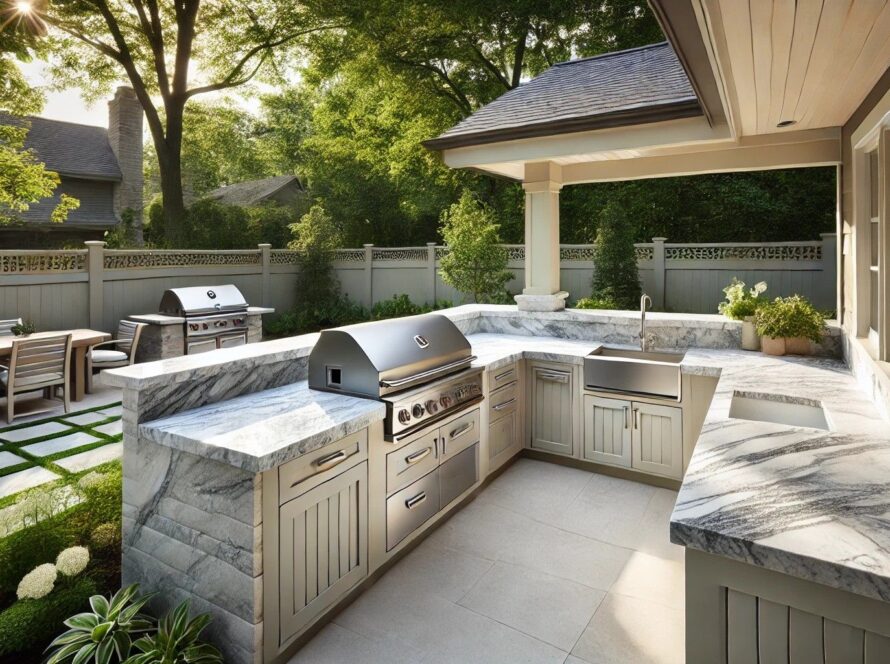Durability of Quartz
Quartz countertops have gained immense popularity in recent years, largely because they combine the best of natural stone with the strength of modern engineering. Quartz is not a naturally occurring stone in the same way granite is; instead, quartz countertops are made from roughly 90-95% ground quartz stone and 5-10% resins and pigments. This engineered composition gives quartz a unique advantage in terms of durability.
One of the biggest selling points of quartz is its non-porous nature. Unlike granite, quartz does not need to be sealed because it is naturally impervious to liquids. This feature makes quartz countertops highly resistant to stains from common kitchen spills like wine, oil, and acidic substances. Whether it’s your morning coffee or a splash of juice, quartz will repel liquids without absorbing them, making it an ideal choice for busy kitchens where spills are inevitable.
Quartz is also incredibly hard, making it highly resistant to scratches, chips, and cracks. While granite is heat-resistant, quartz is more sensitive to high temperatures due to the resins in its composition. It’s not recommended to place hot pans directly on quartz countertops as this can lead to discoloration or warping over time. However, quartz is generally more resistant to impact than granite, meaning it’s less likely to chip or crack if you accidentally drop something heavy on it.
Another factor that makes quartz appealing is its consistent look. Since quartz is engineered, it comes in a wide variety of colors and patterns, often providing a more uniform appearance compared to the natural variations found in granite. This uniformity might be more desirable for homeowners looking for a specific, sleek aesthetic in their kitchens.
Quartz Maintenance
When it comes to maintenance, quartz is generally considered easier to care for than granite. Its non-porous surface doesn’t require sealing, which eliminates one maintenance step that granite owners need to keep in mind. Additionally, the non-porous nature of quartz makes it more hygienic for food prep areas because it doesn’t harbor bacteria or germs in small crevices.
Cleaning quartz countertops is incredibly simple. A mild dish soap and water solution is usually enough for everyday cleaning, and a non-abrasive sponge or cloth will do the trick. For tougher messes or stains, using a gentle, pH-balanced cleaner is recommended. Avoid harsh chemicals or cleaners that contain bleach, as they can damage the resin and affect the countertop’s finish.
In Florida’s warm and humid climate, quartz performs exceptionally well. The non-porous quality means quartz won’t be affected by humidity, making it resistant to mold, mildew, or water damage—perfect for homeowners in Port Charlotte. Plus, its engineered structure ensures that it remains resilient against the effects of the region’s heat and humidity without the need for extra care beyond regular cleaning.
Quartz in Florida Kitchens
For Port Charlotte homeowners, quartz countertops offer a low-maintenance and durable option that stands up well to Florida’s climate. Its ability to resist moisture and staining is a big plus, particularly for homes in more humid or coastal areas. The ease of cleaning, combined with its long-lasting durability, makes quartz an appealing choice for those seeking a more hands-off countertop material. The only consideration is the need to protect quartz from direct heat, but using trivets or hot pads solves this problem easily.
Comparing Granite and Quartz: Which Is More Durable?
Now that we’ve explored the durability and maintenance of granite and quartz individually, it’s time to put them head-to-head. Both materials are known for their strength, but they have some key differences that can help you decide which is better suited for your kitchen.
Durability: Heat Resistance and Impact Strength
When it comes to handling heat, granite takes the crown. Since granite is a natural stone formed by extreme heat within the Earth, it’s incredibly resistant to high temperatures. You can place hot pots and pans directly on granite without worrying about damage. Quartz, on the other hand, is engineered using resins that can melt or warp when exposed to high temperatures. In a kitchen where you often cook with high heat or move hot pans around, granite may be the more durable choice.
However, when it comes to impact strength, quartz tends to be more resistant to chips and cracks compared to granite. While granite is strong, it is more brittle, especially around the edges, and could chip if a heavy object falls on it. Quartz, being a bit more flexible due to its resin content, handles impacts better and is less prone to chipping.
Scratch and Stain Resistance
Both granite and quartz are highly resistant to scratches, but quartz has a slight edge here due to its engineered properties. Granite is tough, but it can still show signs of wear if sharp objects are repeatedly used directly on the surface. Quartz, being engineered with durability in mind, is more resistant to such damage, though it’s always best to use cutting boards to protect both materials.
In terms of stain resistance, quartz wins hands down. Granite’s porous nature means that without proper sealing, it can absorb liquids, leading to stains over time. Quartz, being non-porous, is naturally resistant to stains without needing any extra protective treatments. For homeowners who prioritize low-maintenance and stain-free countertops, quartz is the more durable choice.
Humidity and Climate Suitability
Living in Port Charlotte, Florida, means dealing with heat, humidity, and the occasional coastal storm. So, how do granite and quartz fare in these conditions? Granite, while durable, is more porous and requires regular sealing to prevent moisture from penetrating the surface. Without sealing, granite can absorb moisture, leading to potential issues with staining and mold in humid conditions. This makes regular maintenance a bit more demanding in places like Florida.
Quartz, on the other hand, thrives in humid environments. Its non-porous surface makes it highly resistant to the effects of moisture and humidity. Unlike granite, quartz doesn’t need any special treatments to stay resistant to water and mold, which is a huge plus for Florida homeowners looking for a low-maintenance option.
Long-Term Durability in Busy Kitchens
For families or homeowners who use their kitchen heavily, both granite and quartz offer excellent durability. However, quartz’s non-porous surface and resistance to stains give it a slight edge for those who don’t want the hassle of regular maintenance. If you cook frequently, entertain often, or have children, quartz may be a more durable option that can withstand daily wear and tear without showing signs of aging.
Granite, while incredibly durable, requires a bit more care in terms of sealing and maintenance. If you’re willing to put in the effort to maintain it, granite’s heat resistance and natural beauty make it an excellent choice for those who love the look of natural stone and don’t mind the occasional upkeep.
Maintenance Requirements: Granite vs. Quartz
When it comes to keeping your countertops looking their best, both granite and quartz require attention, but the level of maintenance varies.
Granite Maintenance
Granite, being a natural stone, requires more upkeep compared to quartz. As mentioned earlier, granite is porous, meaning it can absorb liquids if not sealed properly. This means that sealing your granite countertops is essential to prevent stains, particularly from substances like wine, oils, or acidic products such as lemon juice. Most granite countertops require sealing about once a year, although some higher-quality stones may need less frequent applications.
Aside from sealing, granite countertops should be cleaned regularly with mild soap and water. It’s important to avoid abrasive cleaners or harsh chemicals, as they can wear down the sealant and make the stone more vulnerable to staining. While daily cleaning is straightforward, you do need to take a little extra care when spills occur—especially with things that could stain the stone, like red wine or coffee.
Granite is highly durable, but homeowners in humid areas like Port Charlotte might need to pay closer attention to the condition of the sealant, as Florida’s high humidity can wear it down over time. Regularly checking the seal by splashing a little water on the countertop is a good practice—if the water beads up, the seal is intact; if it soaks in, it’s time to reseal.
Quartz Maintenance
One of the best things about quartz is the low maintenance. Since quartz is non-porous it never needs to be sealed, so it’s a no hassle option for homeowners who want beautiful countertops without the extra work. The non-porous surface also means it’s naturally resistant to bacteria, mold and mildew, so it’s a more hygienic option especially in kitchens.
Cleaning quartz countertops is easy: just use a soft cloth, mild soap and water. Since quartz is engineered to be durable it can withstand daily cleaning and occasional deeper cleaning with no problems. But it’s best to avoid harsh chemicals and abrasive scrubbers as these can dull the finish or damage the resins that hold the quartz together.
For homeowners in Port Charlotte where humidity and moisture is always present, quartz is the easy choice. Its non-porous nature means it can resist moisture related issues without any extra sealing or maintenance is a big advantage for those looking for a long-term low effort solution.
Maintenance Verdict
If maintenance is your top priority, quartz is the winner. It requires the least maintenance of the two, just simple cleaning to keep it looking beautiful and durable over time. Granite is still a strong and durable option but requires more hands-on care, periodic sealing and more attention to cleaning habits.
In the durability and maintenance department, both granite and quartz are great options for kitchen countertops, but each has its pros. Granite shines for its natural beauty, heat resistance and timelessness, so if you don’t mind a little extra maintenance it’s a great choice. But its porosity and need for periodic sealing is a bit more work.
Quartz offers superior stain resistance, low maintenance and durability, especially in humid climates like Port Charlotte. Its engineered nature can withstand the daily grind of a busy kitchen with ease, so if you want a more hands off approach to countertop care it’s the way to go.
So it comes down to you and your lifestyle. If you want a more natural look and are willing to do a little maintenance, granite is for you. But if you want a countertop that’s durable and low maintenance, quartz is the way to go.
If you’re still unsure which countertop material is the right choice for your kitchen, we invite you to call or stop by
All Star Granite & Quartz. Our friendly team is here to help you explore all the options, answer any questions, and guide you through the selection process. Whether you’re leaning toward the natural beauty of granite or the low-maintenance appeal of quartz, you can see and feel the difference firsthand at our showroom. Visit us today to discover the perfect countertop for your home!


